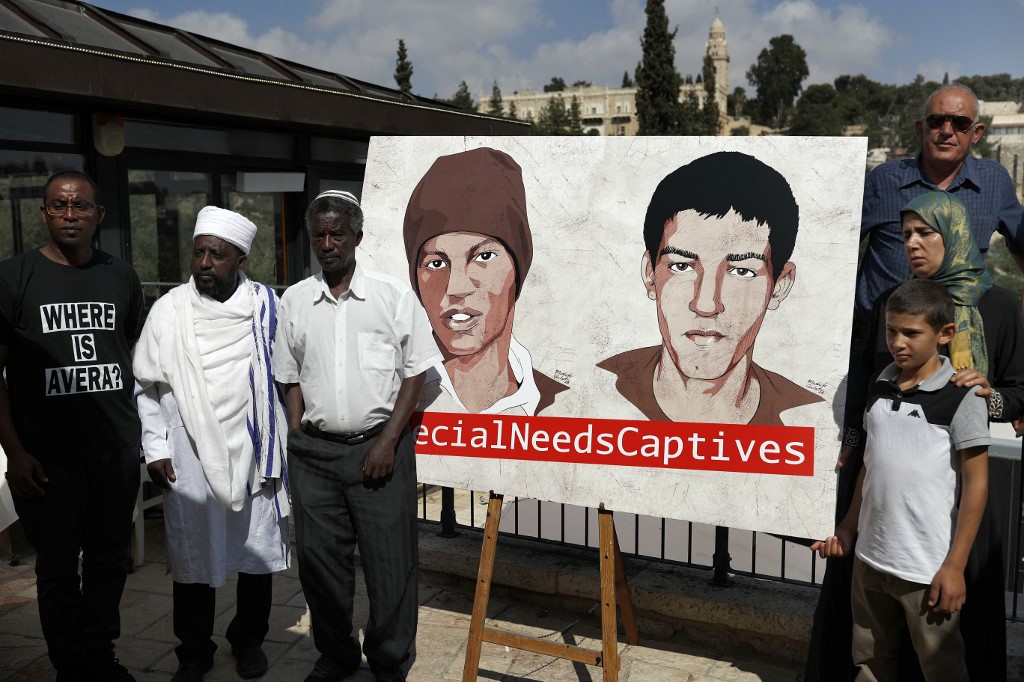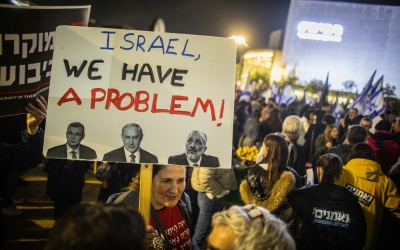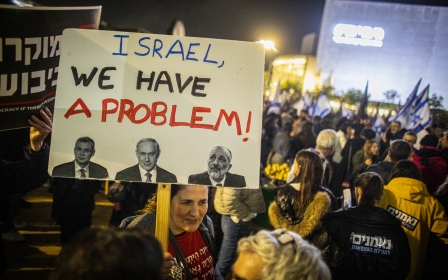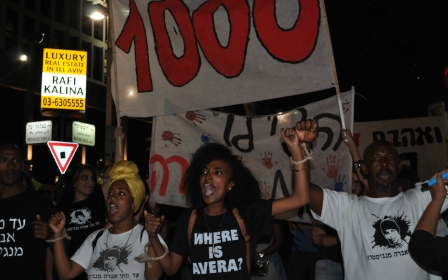Ethiopian Israelis' struggle for dignity is linked to Palestinians'
Last week, we received a reminder that Avera Mengistu is still alive.
Mengistu is an Israeli citizen of Ethiopian origin who climbed over the fence separating Israel and Gaza on 7 September 2014, a few weeks after Israel's onslaught against Gaza, and has been held captive ever since by Hamas.
Last week, a video less than a minute long was released by Hamas with Mengistu appearing for about 12 seconds.
The video is a testament to the unequal value placed on lives in Israel. It is a reminder of Ethiopian Israelis' low position within this structure, and how our struggle for dignity and rights is linked to the Palestinian struggle.
Unlike captive Israeli soldier Gilad Shalit, described by the Israeli public as "the child of us all", the campaign for Mengistu didn't attract wide mobilisation
The timing of the release of the video wasn't coincidental. It was broadcast as Israeli channels reported live from the appointment of the new Israeli army chief of staff.
The video spoiled the festive atmosphere and forced Israeli television to speak Mengistu's name.
Yet, in the short round of Israeli media and state officials' attention, both repeated, in every way possible, that Mengistu was mentally ill and voluntarily crossed the border to Gaza.
With every mention of his captivity, these two details were added with a slight tone of relief. They sharpen the difference between the familiar type of Israeli captive - a soldier or kidnapped civilian - and Mengistu, whose treatment is almost justified.
Unequal value
On the one hand, he is portrayed as a person who is not responsible for his actions, and at the same time, a person who crossed the border knowingly and of his own free will. This narrative downplays both public and state responsibility towards Mengistu.
Ethiopian Israeli political activists have compared the treatment of Mengistu to that of Gilad Shalit, an Israeli soldier of European origin, held captive for five years by Hamas, and released in a prisoner exchange deal with the State of Israel. The campaign to free Shalit attracted mass mobilisation.
The general Israeli public, media and political officials made his name and face known in every house, commonly describing him as "the child of us all". In contrast, the campaign for Mengistu didn't attract wide mobilisation.
Most mentions of Mengistu in public discussion occurred when Hamas attempted to use him as a bargaining chip for different ends.
But, as Hamas knows by now, Mengistu is not "the child of us all". His life is not valued by all, especially by those in power. He is the child of Agarnesh and Ayele, and he is our brother, kin and friend.
Mengistu's unequal value and low place in the Israeli context has been expressed in many ways throughout his eight and a half years in captivity.
On one occasion, Imaye Taga, a football player of Ethiopian origin, wore a uniform with a message of solidarity for Shalit and received praise for his action. In 2016 he repeated the act, this time for Mengistu, and was fined by the football association for violating its rules.
In the early months of Mengistu's captivity, his family handled the case with minimal publicity on the recommendation of various state actors that this would increase the chances of getting their son home quickly.
With time, family members and activists began to criticise the lack of progress and its connection to him being Ethiopian, reflecting the group's broader marginalisation in Israel.
Wider marginalisation
In 2015, then (and now) Prime Minister Benjamin Netanyahu's chief negotiator Lior Lotan triggered uproar following his visit to the family threatening them to not link Mengistu's case to the broader issues of discrimination against the Ethiopian community in Israel.
Thanks to a voice recording taken by an attendee, we get a glimpse of the behind-the-scenes. It is a case of the hands of Esau and the voice of Jacob.
The meeting began with a short phone conversation between the prime minister and the family members. On the call, Mengistu's father said to the prime minister that he had written to him several times with no response.
The struggle of Ethiopians in Israel will never see true justice without tying our fate to the Palestinian one, and rethinking our relationship with the State
Giving the family an ultimatum, Lotan then responded in a way that reveals the truth underlying the relationship between the state and the family, saying:
"You have two options: You can point the finger at Hamas and say: 'You hold Avera, you are responsible for his fate, give him back to us [...] or you can point the finger at Jerusalem and say, 'You're not okay. You let him cross the border [into Gaza]. You never responded to our letters. [...] Choose what you want, but [you'll] be responsible for the outcome," he warned.
In 2015, Hisham al-Sayed, an Israeli soldier of Arab origin, who also suffers from mental health issues, was held captive by Hamas after crossing into Gaza by foot.
About six months ago, Sayed was seen in a video released by Hamas in poor medical condition. Here, too, we witness the politics of how different lives are valued in Israel.
The near total absence of Sayed from the public imagination reminds us that Palestinians' lives and value are controlled by a political relationship of a different order. It is one that places them outside of conversations on solidarity or state responsibility towards its citizens altogether.
Though embodying struggles of different orders, they are nonetheless linked in fundamental ways.
Mengistu's neglect reminds us that Ethiopian Israelis' lives are a terrible bargaining chip, while Sayed's erasure reveals the far-reaching extent of state violence.
Our generation's task must be understanding the link between the two and imagining a shared future. The struggle of Ethiopians in Israel will never see true justice without tying our fate to the Palestinian one, and rethinking our relationship with the State.
"I will tell you this in the harshest way possible," said the prime minister's negotiator in the aforementioned conversation, "whoever burdens Avera with the story between the Ethiopian community and the State of Israel, leaves him in Gaza for another year".
The many connections between Mengistu's situation and the marginalisation of Ethiopians have since been silenced.
As a result, he remains in captivity for over eight years since, and he and his family continue to suffer.
The views expressed in this article belong to the author and do not necessarily reflect the editorial policy of Middle East Eye.
Middle East Eye propose une couverture et une analyse indépendantes et incomparables du Moyen-Orient, de l’Afrique du Nord et d’autres régions du monde. Pour en savoir plus sur la reprise de ce contenu et les frais qui s’appliquent, veuillez remplir ce formulaire [en anglais]. Pour en savoir plus sur MEE, cliquez ici [en anglais].







